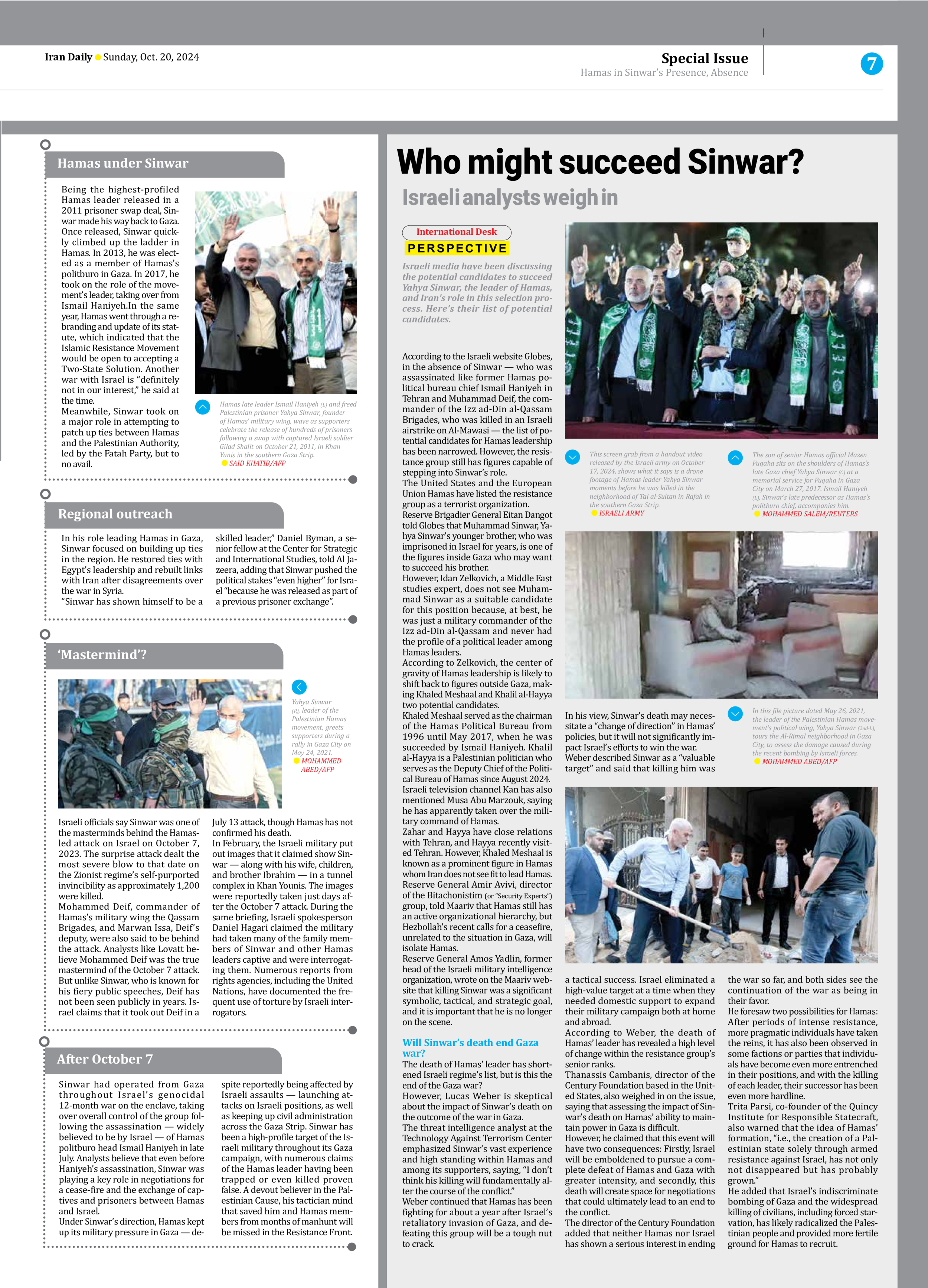
Who might succeed Sinwar?
Israeli analysts weigh in
Israeli media have been discussing the potential candidates to succeed Yahya Sinwar, the leader of Hamas, and Iran’s role in this selection process. Here’s their list of potential candidates.
According to the Israeli website Globes, in the absence of Sinwar — who was assassinated like former Hamas political bureau chief Ismail Haniyeh in Tehran and Muhammad Deif, the commander of the Izz ad-Din al-Qassam Brigades, who was killed in an Israeli airstrike on Al-Mawasi — the list of potential candidates for Hamas leadership has been narrowed. However, the resistance group still has figures capable of stepping into Sinwar’s role.
The United States and the European Union Hamas have listed the resistance group as a terrorist organization.
Reserve Brigadier General Eitan Dangot told Globes that Muhammad Sinwar, Yahya Sinwar’s younger brother, who was imprisoned in Israel for years, is one of the figures inside Gaza who may want to succeed his brother.
However, Idan Zelkovich, a Middle East studies expert, does not see Muhammad Sinwar as a suitable candidate for this position because, at best, he was just a military commander of the Izz ad-Din al-Qassam and never had the profile of a political leader among Hamas leaders.
According to Zelkovich, the center of gravity of Hamas leadership is likely to shift back to figures outside Gaza, making Khaled Meshaal and Khalil al-Hayya two potential candidates.
Khaled Meshaal served as the chairman of the Hamas Political Bureau from 1996 until May 2017, when he was succeeded by Ismail Haniyeh. Khalil al-Hayya is a Palestinian politician who serves as the Deputy Chief of the Political Bureau of Hamas since August 2024.
Israeli television channel Kan has also mentioned Musa Abu Marzouk, saying he has apparently taken over the military command of Hamas.
Zahar and Hayya have close relations with Tehran, and Hayya recently visited Tehran. However, Khaled Meshaal is known as a prominent figure in Hamas whom Iran does not see fit to lead Hamas.
Reserve General Amir Avivi, director of the Bitachonistim (or “Security Experts”) group, told Maariv that Hamas still has an active organizational hierarchy, but Hezbollah’s recent calls for a ceasefire, unrelated to the situation in Gaza, will isolate Hamas.
Reserve General Amos Yadlin, former head of the Israeli military intelligence organization, wrote on the Maariv website that killing Sinwar was a significant symbolic, tactical, and strategic goal, and it is important that he is no longer on the scene.
Will Sinwar’s death end Gaza war?
The death of Hamas’ leader has shortened Israeli regime’s list, but is this the end of the Gaza war?
However, Lucas Weber is skeptical about the impact of Sinwar’s death on the outcome of the war in Gaza.
The threat intelligence analyst at the Technology Against Terrorism Center emphasized Sinwar’s vast experience and high standing within Hamas and among its supporters, saying, “I don’t think his killing will fundamentally alter the course of the conflict.”
Weber continued that Hamas has been fighting for about a year after Israel’s retaliatory invasion of Gaza, and defeating this group will be a tough nut to crack.
In his view, Sinwar’s death may necessitate a “change of direction” in Hamas’ policies, but it will not significantly impact Israel’s efforts to win the war.
Weber described Sinwar as a “valuable target” and said that killing him was a tactical success. Israel eliminated a high-value target at a time when they needed domestic support to expand their military campaign both at home and abroad.
According to Weber, the death of Hamas’ leader has revealed a high level of change within the resistance group’s senior ranks.
Thanassis Cambanis, director of the Century Foundation based in the United States, also weighed in on the issue, saying that assessing the impact of Sinwar’s death on Hamas’ ability to maintain power in Gaza is difficult.
However, he claimed that this event will have two consequences: Firstly, Israel will be emboldened to pursue a complete defeat of Hamas and Gaza with greater intensity, and secondly, this death will create space for negotiations that could ultimately lead to an end to the conflict.
The director of the Century Foundation added that neither Hamas nor Israel has shown a serious interest in ending the war so far, and both sides see the continuation of the war as being in their favor.
He foresaw two possibilities for Hamas: After periods of intense resistance, more pragmatic individuals have taken the reins, it has also been observed in some factions or parties that individuals have become even more entrenched in their positions, and with the killing of each leader, their successor has been even more hardline.
Trita Parsi, co-founder of the Quincy Institute for Responsible Statecraft, also warned that the idea of Hamas’ formation, “i.e., the creation of a Palestinian state solely through armed resistance against Israel, has not only not disappeared but has probably grown.”
He added that Israel’s indiscriminate bombing of Gaza and the widespread killing of civilians, including forced starvation, has likely radicalized the Palestinian people and provided more fertile ground for Hamas to recruit.







